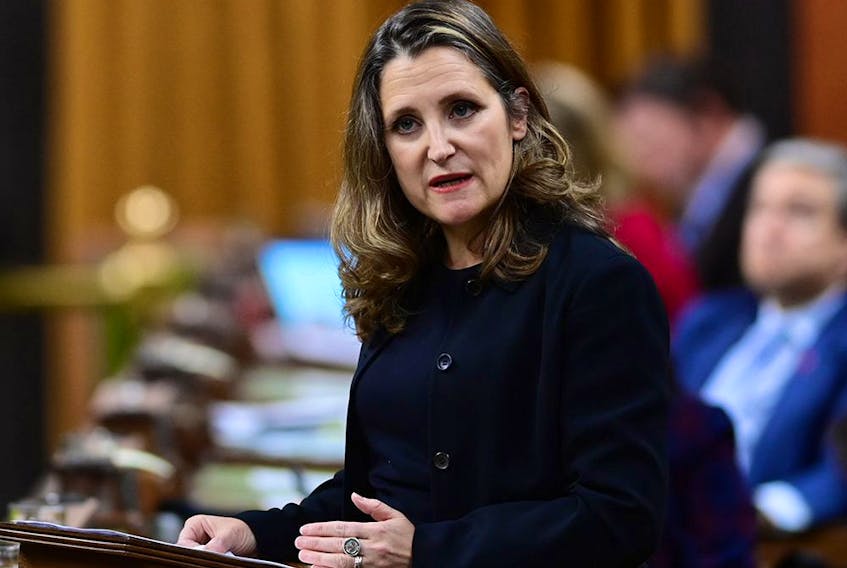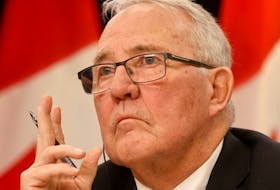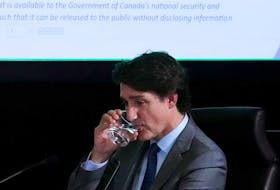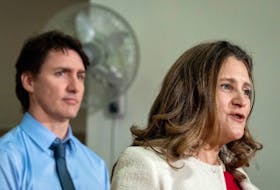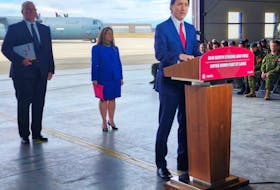This week’s fiscal update has already passed from the news cycle.
The sums we are talking about are so mind-blowing — $621 billion in government spending this year — that shaken citizens have ignored the barking fiscal watchdogs and the caravan has moved on.
Maybe we should call it the banality of spending – a minister buying a $16 orange juice induces thrombosis but a government that doubles net federal debt in five years would be re-elected with a majority were an election held tomorrow.
The Liberals could be excused their mistakes in the early fog of the pandemic. As one veteran policy-maker noted, Ottawa realized it could be fast or accurate, but not both. Benefits were so absurdly generous that household income rose 11 per cent, even as GDP tumbled.
Yet given the chance to re-align benefits closer to lost income, the Liberals doubled-down, increasing the money available under the wage subsidy and disbursing an extra $1,200 in Canada Child Benefit to 1.6 million families. Mistakes are presented as virtues – a “pre-loading” of stimulus into bank accounts across the land.
That pent-up demand has not removed the need to inject a further $100 billion in stimulus in “smart, time-limited investments” over the next three fiscal years.
Stimulus spending, by its very nature, is temporary. Yet elsewhere in the fiscal update, the government committed itself to “historic investments” in a national daycare system and the implementation of universal pharmacare. Justin Trudeau has also spoken about his openness to increasing health transfers to the provinces.
Permanent social programs are not stimulus.
The undefined temporary spending package envisaged in the fiscal update would see deficits average $115 billion for three fiscal years and the debt to GDP ratio average 57 per cent, BEFORE any additional spending on childcare, pharmacare or health.
There is no mention of how any of this spending would be paid for – it would simply be added to a national federal debt that has risen from $615 billion when the Trudeau government took power to $1.2 trillion this year.
Mike Myers’ Dr. Evil could be forgiven for his failure to appreciate the concept of multi-decade inflation when he demanded a ransom of “One Million Dollars” – he’d been cryogenically frozen for 30 years.
But taxpayers befuddled by millions, billions and trillions should understand that what is taking place is a massive rip-off of future generations, who will be handed the bill for today’s consumption.
The cost of servicing that debt is as low as it has ever been and the government touts a management strategy that locks into low rates by issuing more long-term debt.
But that doesn’t mean taxpayers aren’t obliged to pay it off; it just means they will never stop paying it off.
As Paul Boothe, a former senior public servant at Finance Canada, put it, we need to have a discussion about taxes.
Even before its $100 billion stimulus package, daycare, pharmacare or new health transfers, Ottawa plans to spend an average of 17.6 per cent of GDP on programs over the next six years, up from 12.9 per cent in 2014/15. Budgetary revenues, as a percentage of the economy, are predicted to average 14.3 per cent over the same period, while real growth is expected to be an anaemic 1.4 per cent, thanks in part to an aging population.
The sharper minds out there might see the problem here.
“Giving away money is the easiest thing to do in government. Collecting it is less easy. And the hardest thing is to deliver services efficiently,” said Boothe.
“With permanent programs, you need to talk about how you are going to fund them. We need to know the costs as well as the benefits.”
Giving away money is the easiest thing to do in government
The only tax increases in the fiscal update were applied on corporations – in this case, GST and HST on digital products and goods held in fulfillment warehouses. Inevitably, they will be passed on to consumers but that’s not the government’s concern.
Trudeau and Finance Minister Chrystia Freeland are banking on getting the electoral credit for vast hikes in program spending, while evading accountability on rising debt levels.
The finance minister blamed the pandemic for not committing to a fiscal anchor, or in her words “not locking into a rigid pre-determined calendar.”
It seems the Liberals have learned the hard way not to make promises they may not be able to keep, such as the 2015 platform commitment to end boil water advisories on reserves by next March, a pledge they admitted this week will not be met. Better to keep things ambiguous going forward.
It will probably be no comfort to be reminded that in times like these, there have always been times like these.
They come along when governments forget that budget constraints are a fundamental principle of economics. And they tend not to end well.
• Email: [email protected] | Twitter: IvisonJ
Copyright Postmedia Network Inc., 2020

